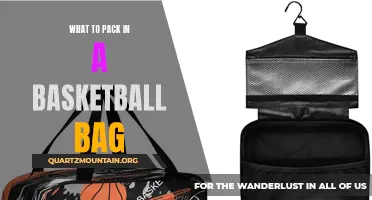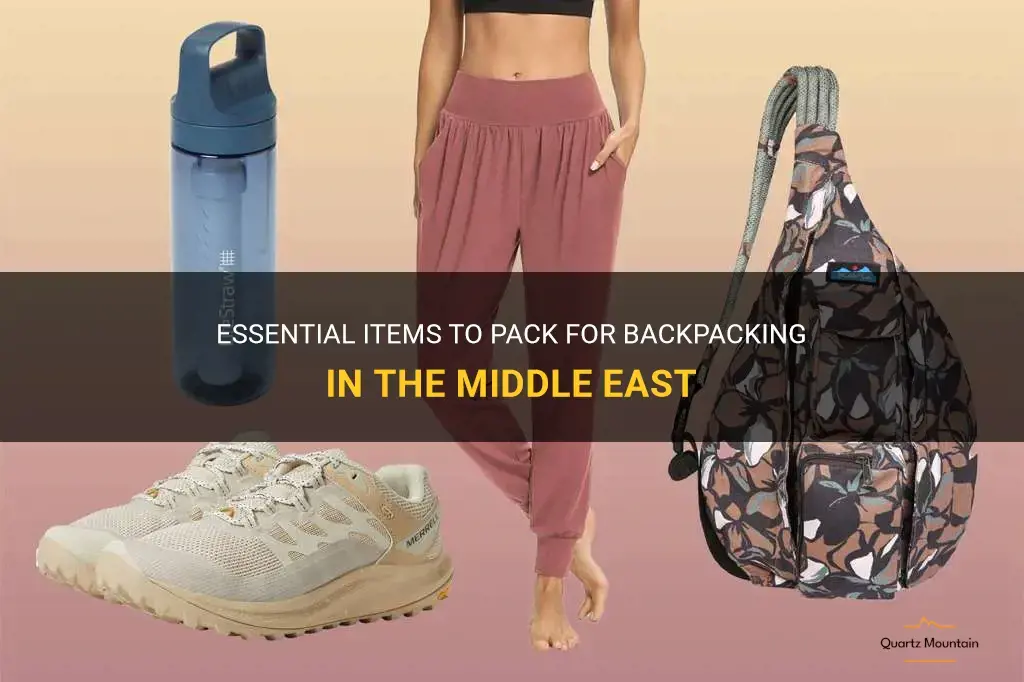
Are you planning a backpacking adventure in the Middle East? As you prepare to embark on this thrilling journey, it is crucial to ensure that you have all the essential items packed. The Middle East has a unique blend of cultural experiences and stunning landscapes, but it also poses some unique challenges. In this guide, we will explore the must-pack items that will make your backpacking trip in the Middle East successful and enjoyable. From sunscreen to proper attire, we've got you covered. So, let's dive in and make sure you're well-prepared for the adventure of a lifetime in the Middle East.
What You'll Learn
- What are the essential items to pack when backpacking in the Middle East?
- How should I dress when backpacking in conservative Middle Eastern countries?
- Are there any specific items I should pack for long hikes or treks in the Middle East?
- What should I pack to protect myself from the sun and heat in the Middle East?
- Are there any cultural considerations I should keep in mind when packing for a backpacking trip in the Middle East?

What are the essential items to pack when backpacking in the Middle East?
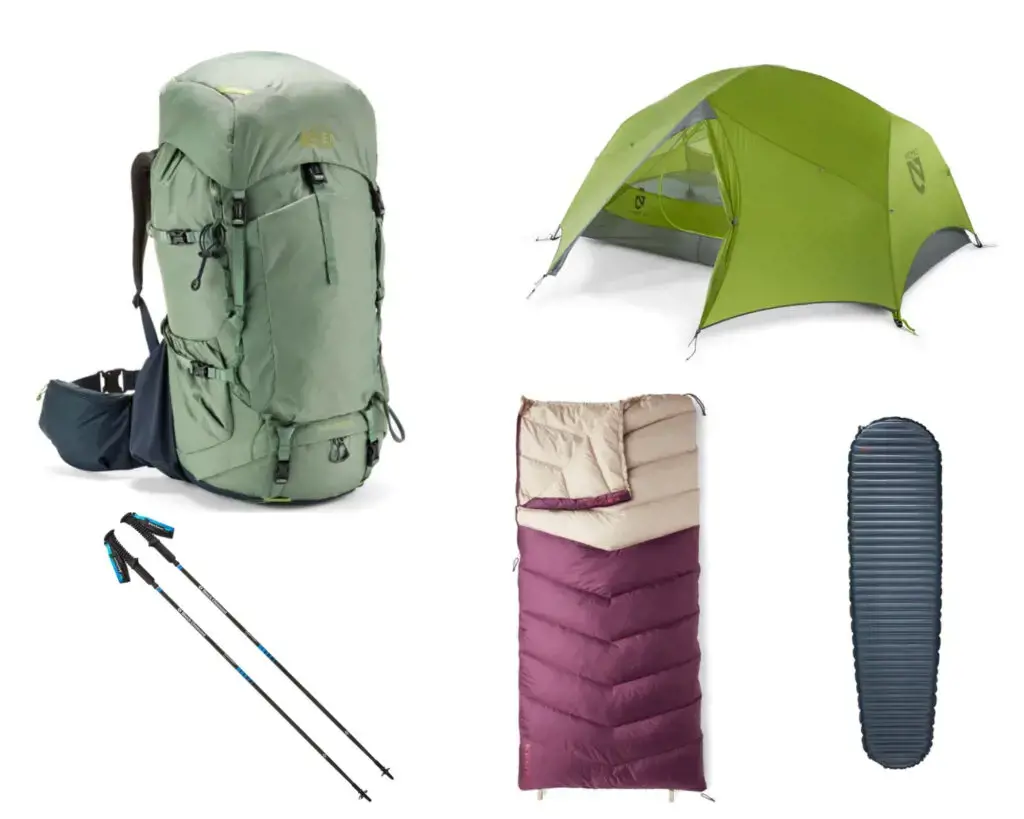
When backpacking in the Middle East, it is important to pack carefully and include essential items to ensure a comfortable and safe journey. The unique climate and cultural norms of the region require specific items that may not be necessary in other parts of the world. Here are some essential items to pack when backpacking in the Middle East.
- Lightweight clothing: The Middle East is known for its hot and arid climate, so lightweight and breathable clothing is a must. Pack loose-fitting shirts and pants made from lightweight and moisture-wicking materials such as cotton or linen. This will help keep you cool and comfortable, especially during the scorching summer months.
- Sun protection: The Middle East experiences intense sunlight, so it is crucial to pack sun protection items. Carry a wide-brimmed hat, sunglasses with UV protection, and high SPF sunscreen. These items will shield you from the harmful effects of the sun and prevent sunburns.
- Scarf or shawl: In many parts of the Middle East, especially conservative regions, it is customary for women to cover their heads and shoulders. Even if you are not required to do so, it is a sign of respect to adhere to local customs. Packing a lightweight scarf or shawl will allow you to cover up when needed and blend in with the local culture.
- Water bottle and water purification tablets: Staying hydrated is essential when traveling in the Middle East, as the temperatures can be extremely high. Carry a reusable water bottle and fill it up whenever you have access to safe drinking water. It is also wise to pack water purification tablets or a portable water filter, as the tap water may not always be safe for consumption.
- First aid kit: Having a compact first aid kit is essential for any backpacking trip, and the Middle East is no exception. Include basic medical supplies such as band-aids, antiseptic ointment, pain relievers, and any necessary prescription medications. Be sure to familiarize yourself with local customs regarding medication importation to avoid any legal issues.
- Electrical adaptors: The Middle East uses different types of electrical plugs and voltage than many other regions. It is crucial to pack electrical adaptors to ensure that your electronic devices can be charged. Research the specific adaptors required for the countries you will be visiting and pack accordingly.
- Travel insurance: It is always a good idea to have travel insurance while backpacking, but it is particularly important in the Middle East. This region can have political instability and occasional security issues, so having comprehensive travel insurance will provide peace of mind and protection in case of unforeseen circumstances.
- Local currency and copies of important documents: Before traveling to the Middle East, make sure to have the local currency on hand, as not all places accept credit cards. Additionally, make copies of important documents such as your passport, visas, and travel insurance. Keep these copies separate from the originals in case of loss or theft.
By packing these essential items, you will be better prepared for your backpacking adventure in the Middle East. Remember to also research and respect local customs and laws while traveling in this culturally rich and diverse region.
How Packing Cubes Can Help Reduce Weight in Your Luggage
You may want to see also

How should I dress when backpacking in conservative Middle Eastern countries?
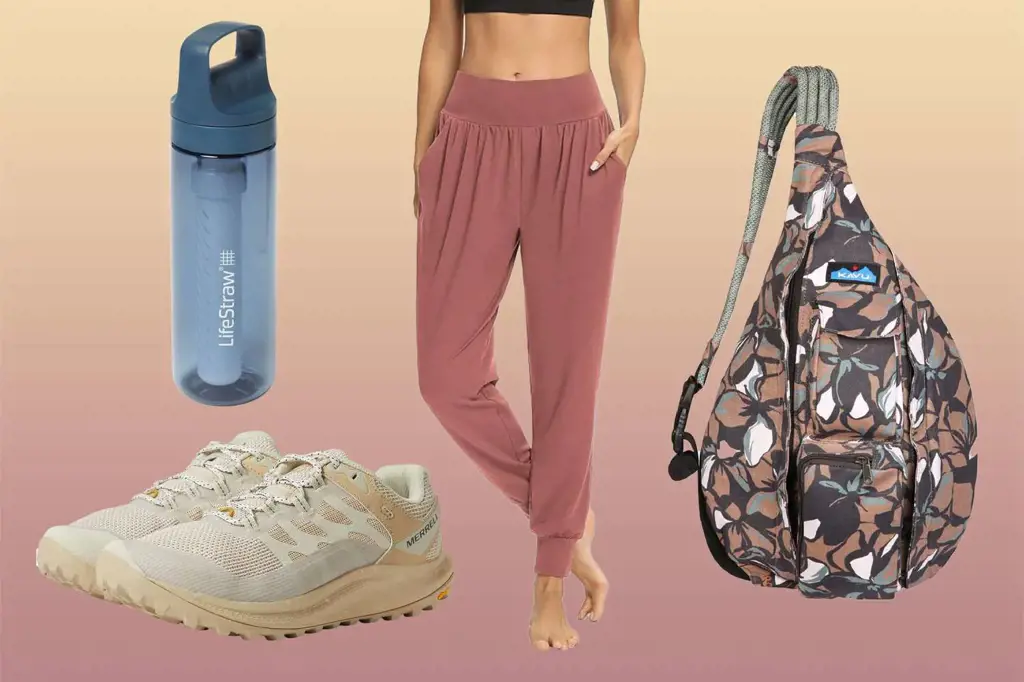
When backpacking in conservative Middle Eastern countries, it is important to dress in a way that respects the cultural norms and values of the region. By doing so, you will not only avoid offending the locals but also have a more fulfilling and safe travel experience. Here are some guidelines on how to dress appropriately:
- Research the local culture: Before your trip, take the time to learn about the specific dress codes and cultural norms of the countries you plan to visit. Each country may have its own unique customs and expectations, so it's important to be aware of them.
- Cover your shoulders and knees: In most conservative Middle Eastern countries, it is generally expected for both men and women to dress modestly. This means avoiding clothing that reveals too much skin. Women should wear loose-fitting tops that cover their shoulders and avoid clothing that is tight or revealing. Similarly, men should avoid wearing sleeveless shirts or shorts that are too short.
- Choose lightweight and breathable fabrics: The Middle East can be extremely hot, especially during the summer months. It is advisable to pack lightweight and breathable clothing that will help keep you cool and comfortable. Natural fabrics like cotton and linen are good choices as they allow air to circulate and absorb sweat.
- Opt for loose-fitting clothes: Loose-fitting clothing not only helps you stay cool but also respects the local customs. Loose-fitting clothes give a more modest appearance and help ensure you do not inadvertently offend locals. Avoid tight or body-hugging clothes, especially for women.
- Consider traditional attire: One way to show cultural respect while also staying comfortable is by wearing traditional attire. For example, in countries like Saudi Arabia, women often wear abayas, which are long, loose robes that cover the entire body, while men wear traditional thobes. By opting for traditional clothing, you can blend in better with the locals and show your appreciation for their culture.
- Be mindful of accessories: In some conservative Middle Eastern countries, it may be best to avoid wearing excessive jewelry or accessories. Keeping it simple and minimalistic is a safer bet. It's also important to be aware of local attitudes towards tattoos, piercings, and other body modifications, as these may be frowned upon in some cultures.
- Dress appropriately for religious sites: When visiting religious sites, it is important to dress even more conservatively. Both men and women may be required to cover their heads, shoulders, and sometimes their legs. It's a good idea to carry a scarf or shawl with you so that you can cover up when needed.
Overall, the key is to be respectful and mindful of the local culture when deciding how to dress when backpacking in conservative Middle Eastern countries. By adhering to the local customs and dressing modestly, you will be able to navigate the region with ease and respect the values of the people you encounter. Remember, your clothing choices can have a significant impact on how you are perceived and treated, so it's important to be aware of and sensitive to the cultural norms of the places you visit.
Essential Snow Gear: What to Pack for a Winter Wonderland
You may want to see also

Are there any specific items I should pack for long hikes or treks in the Middle East?
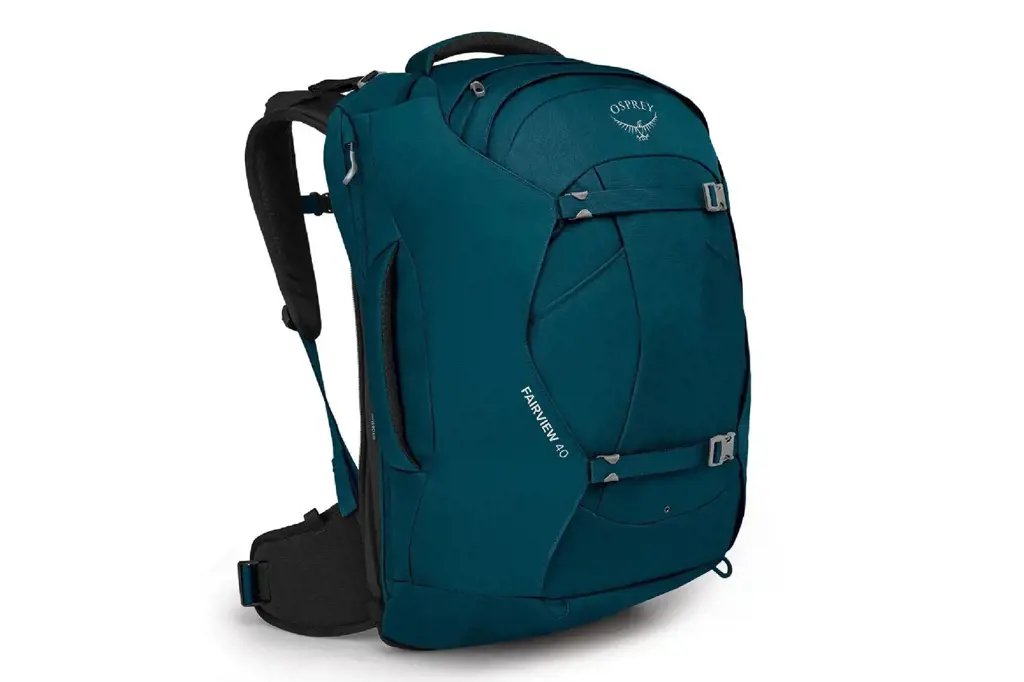
When preparing for a long hike or trek in the Middle East, there are certain items that you should definitely pack to ensure a safe and comfortable journey. The Middle East is known for its diverse landscapes, ranging from desert dunes to rocky mountains, so it's important to be well-equipped for any situation you may encounter. Here are some specific items that you should consider packing for your adventure:
- Sturdy and comfortable hiking boots: The terrain in the Middle East can be challenging, with rough and uneven surfaces. Invest in a pair of well-fitting hiking boots that provide good ankle support and have a durable sole to protect your feet from sharp rocks and thorns.
- Lightweight and breathable clothing: As the Middle East can experience extreme temperatures, it's essential to pack clothing that will keep you cool and protected from the sun. Opt for lightweight, moisture-wicking fabrics that provide protection from UV rays. Consider packing a hat with a wide brim for added sun protection.
- Ample water supply: Hydration is crucial when hiking in the Middle East, especially during the hot summer months. Carry a sufficient amount of water and make sure you have a reliable water purification system. Portable water filters or purifying tablets can be handy in case you run out of clean water.
- High-energy snacks: Pack a variety of high-energy snacks such as nuts, energy bars, and dried fruits to keep you fueled throughout your hike. These snacks provide a quick source of energy and are easy to carry in your backpack.
- First aid kit: It's important to have a well-stocked first aid kit with you at all times. Include items such as bandages, blister pads, antiseptic ointment, pain relievers, and any necessary medications. Also, make sure you are familiar with basic first aid procedures.
- Navigation tools: Since some trails in the Middle East may not be well-marked or have limited signage, it's crucial to have reliable navigation tools. Carry a map of the area, a compass, and a GPS device or smartphone with a reliable offline map app.
- Sunscreen and insect repellent: Protect your skin from the sun's harmful rays by applying a high SPF sunscreen regularly. Additionally, mosquitoes and other insects can be common in certain areas, so bring insect repellent to prevent bug bites.
- Safety equipment: Depending on the specific hike or trek you're planning, you may need additional safety equipment such as a headlamp, a whistle, a multi-tool, or a fire starter. These items can come in handy in emergency situations.
Remember to pack light and only bring essential items to avoid unnecessary weight. It's also important to check the weather forecast and any specific requirements for the trail you'll be hiking. Always inform someone of your itinerary and expected return time before embarking on your journey. With the right preparation and packing, you can have a safe and fulfilling hiking or trekking experience in the Middle East.
Essential Packing List for Virginia Tech Students
You may want to see also

What should I pack to protect myself from the sun and heat in the Middle East?
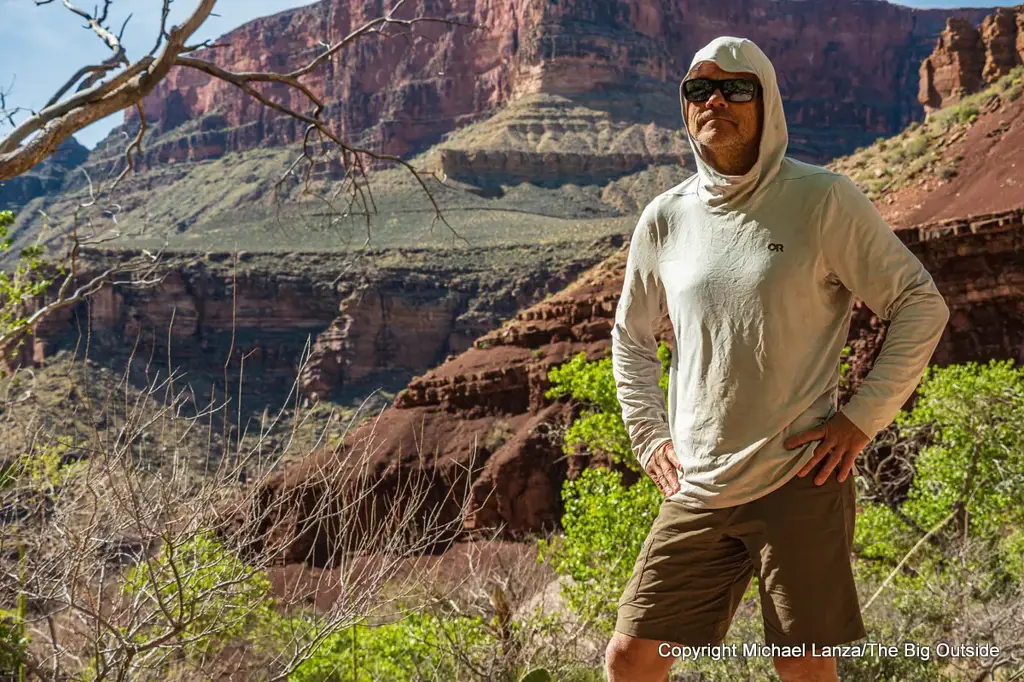
When planning a trip to the Middle East, it is essential to pack items that will protect you from the region's intense sun and heat. The Middle East, known for its arid and desert climate, can experience scorching temperatures, especially during the summer months. To ensure your health and well-being, consider including the following items in your packing list:
- Sunscreen: A high SPF sunscreen is a must-have item when traveling to the Middle East. Look for a broad-spectrum sunscreen with at least SPF 30, which will protect your skin from both UVA and UVB rays. Apply sunscreen generously and frequently, especially if you plan on spending extended periods of time outdoors.
- Lightweight and breathable clothing: Opt for loose-fitting and lightweight clothing made from breathable fabrics such as cotton or linen. This will help to keep you cool and comfortable in the blistering heat. Long-sleeved shirts and pants can also provide extra protection from the sun.
- Wide-brimmed hat: A wide-brimmed hat is an excellent accessory to shield your face and neck from the sun. Look for a hat with a brim that is at least 3 inches wide to provide adequate coverage. This will help to prevent sunburn and heatstroke.
- Sunglasses: Protect your eyes from the intense sunlight by wearing sunglasses with UV protection. Look for sunglasses that block 100% of UVA and UVB rays to ensure maximum protection. Additionally, polarized lenses can reduce glare, making it easier to see in bright conditions.
- Hydration pack or water bottle: Staying hydrated is crucial when visiting a hot climate. Carry a hydration pack or a reusable water bottle with you at all times and make sure to drink plenty of water throughout the day. Avoid drinking tap water and opt for bottled water or use a water purifier if necessary.
- Lightweight and breathable footwear: Choose comfortable and breathable footwear such as sandals or breathable sneakers. Avoid shoes that trap heat, as this can lead to discomfort and blisters. Additionally, consider packing moisture-wicking socks to keep your feet dry.
- Cooling towel or misting fan: To cool down in extreme heat, consider packing a cooling towel or a misting fan. These items help to cool your body temperature and provide instant relief. Simply wet the towel or use the misting fan to spray a fine mist of water on your face and neck.
- Lip balm and moisturizer: The sun and heat can quickly dry out your skin and lips. Pack a moisturizing lip balm with SPF to protect your lips from becoming chapped or sunburned. Additionally, bring a lightweight moisturizer to keep your skin hydrated throughout the day.
- Umbrella or parasol: If you cannot find shade, having a portable umbrella or parasol can provide temporary relief from the sun. It can also be handy during sandstorms or dusty weather conditions.
- Electrolyte supplements: In extreme heat, you can quickly become dehydrated and lose electrolytes through sweat. Consider bringing electrolyte supplements to replenish these essential minerals and prevent dehydration.
Remember to listen to your body and take breaks in shaded areas when the heat becomes overwhelming. Adjust your activities and itinerary accordingly to minimize exposure to the sun during peak hours. By packing these essential items and practicing sun-safe behaviors, you can stay protected from the sun and heat while enjoying your time in the Middle East.
Packing Tips: Anthony Bourdain's Must-Have Items for Travel
You may want to see also

Are there any cultural considerations I should keep in mind when packing for a backpacking trip in the Middle East?
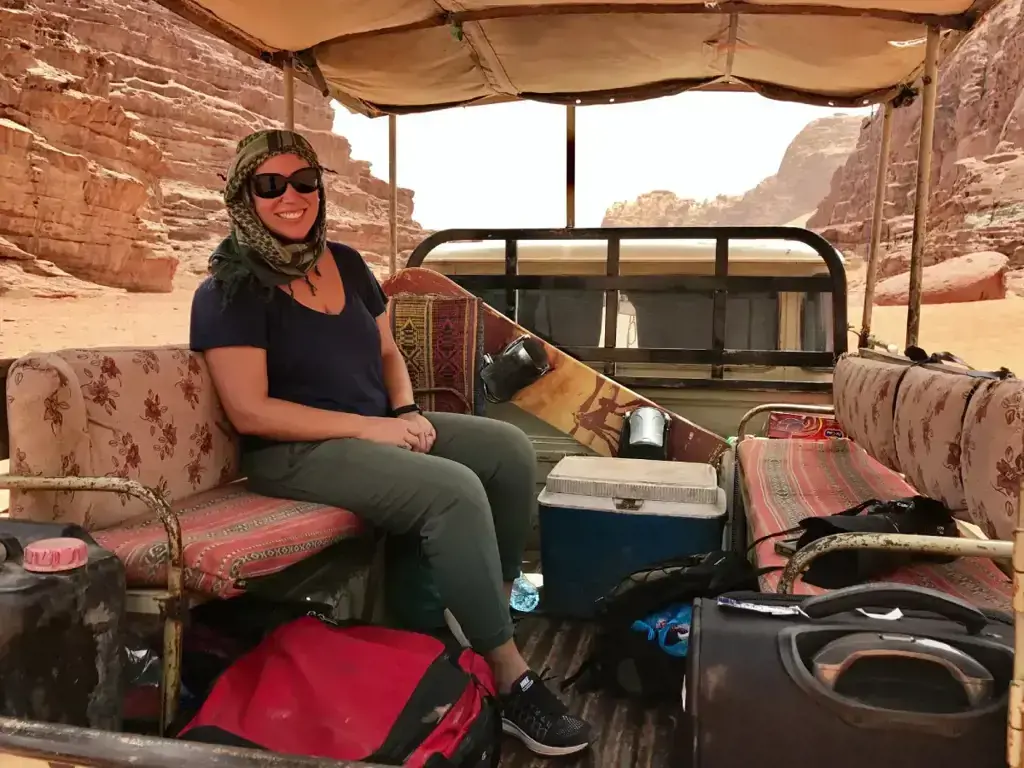
When packing for a backpacking trip in the Middle East, it is important to keep in mind the cultural considerations of the region. The Middle East is known for its rich history, diverse cultures, and traditional values. To ensure a respectful and enjoyable experience, here are some key considerations to keep in mind when packing for your trip.
- Modesty: The Middle East is generally a conservative area, and modesty is highly valued. It is important to dress modestly, especially when visiting religious sites or conservative areas. Both men and women should opt for clothing that covers their shoulders, chest, and knees. Avoid tight-fitting or revealing clothing to show respect for the local culture.
- Scarves and Shawls: Women should consider carrying a light scarf or shawl to cover their head and shoulders when visiting religious sites or conservative areas. This simple gesture shows respect for local customs and traditions.
- Cultural Awareness: It is important to be aware of the cultural norms and customs of the specific country you are visiting in the Middle East. Different countries may have different dress codes and expectations, so do thorough research before your trip. Respect local traditions, and be mindful of your behavior, language, and social interactions.
- Footwear: Comfortable and practical footwear is essential for backpacking trips, but it is also crucial to consider cultural norms. In many Middle Eastern countries, it is customary to remove your shoes before entering someone's home or certain establishments. Consider packing a pair of slip-on shoes or sandals that are easy to take off and put on.
- Sun Protection: The Middle East is known for its hot and sunny climate. It is important to pack appropriate sun protection gear, including a wide-brimmed hat, sunglasses, and sunscreen with a high SPF. Protecting your skin from the sun is not only important for your health but also demonstrates cultural sensitivity.
- Electronic Devices: While it is common to use smartphones and other electronic devices while traveling, it is crucial to be mindful of the cultural sensitivities surrounding photography and privacy. Always ask for permission before taking photos of individuals, especially women or religious sites. Respect people's privacy and be aware of any restricted areas or sensitive subjects.
- Cultural Souvenirs: Consider packing a small selection of souvenirs from your home country to exchange with locals or as a token of appreciation. This can help foster positive cultural exchanges and promote understanding between different cultures.
- Respect for Local Customs: Lastly, it is important to be respectful and aware of the local customs and traditions. Learn a few basic phrases in the local language, such as greetings and thank you. This simple effort can go a long way in building positive and respectful relationships with locals.
In conclusion, when packing for a backpacking trip in the Middle East, it is crucial to be mindful of the cultural considerations of the region. Dressing modestly, respecting local customs, and being aware of cultural sensitivities are important steps to ensure a respectful and enjoyable experience. By packing with cultural sensitivity in mind, you can have a more immersive and meaningful experience in the Middle East.
What to Pack for a Four-Day Vacation: Essential Items to Consider
You may want to see also
Frequently asked questions
When packing for backpacking in the Middle East, it is important to consider the climate, cultural norms, and activities you plan on engaging in. Here are some essential items to pack:
It is important to dress modestly and respect local customs when visiting the Middle East. In general, you should bring lightweight and loose-fitting clothing that covers your shoulders and knees. Long-sleeve shirts, long pants or skirts, and scarves or shawls to cover your head or shoulders may be necessary. It is also a good idea to pack a lightweight jacket or cardigan for cooler evenings or air-conditioned spaces.
When backpacking in the Middle East, it is always useful to have a few accessories. A good quality and comfortable backpack with a rain cover is essential for carrying your belongings. Other useful accessories to consider include a money belt or pouch to keep your valuables safe, a sturdy water bottle for staying hydrated, a hat or cap to protect you from the sun, and a travel towel that is quick-drying and lightweight.
It is crucial to have the necessary documents when backpacking in the Middle East. Make sure to bring a valid passport with at least six months' validity remaining. In some cases, you may also need a visa to enter certain countries. It is always advisable to check the visa requirements for each country you plan on visiting ahead of time. Additionally, having photocopies of your passport, visa, and other important documents is also a good idea in case of loss or theft.







